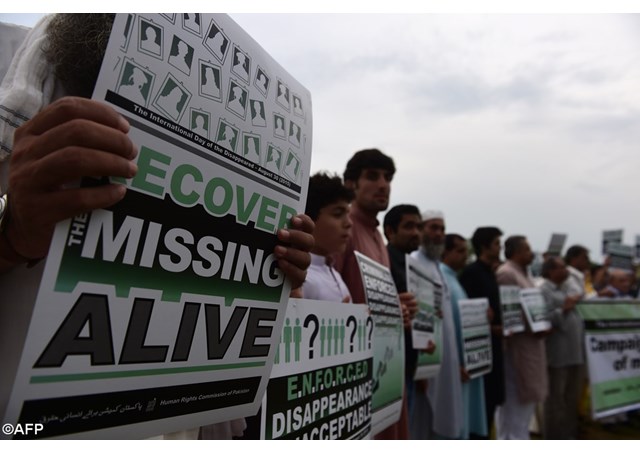
Investigate enforced disappearances, activists urge Sri Lanka

Activists in Sri Lanka are urging the government to ratify a key international convention on enforced disappearances and to investigate thousands of unsolved cases that have haunted the island nation through decades of conflict.
Catholic Church officials say the issue is especially vital in Sri Lanka. Father Nandana Manathunga said Sri Lanka has the second-highest number of disappearances in the world. Yet the country has not ratified the International Convention for the Protection of All Persons from Enforced Disappearances.
"It is the right of the parents to know what happened to their loved ones," said Father Manathunga, director of the human rights center in Kandy diocese. "We urge the government to publish a list of detainees."
On Sept. 5, Father Manathunga is staging an event to mark Sri Lanka’s unsolved disappearances with the families of those who are missing.
Enforced disappearances have been an ongoing issue in Sri Lanka for decades. The Janatha Vimukthi Peramuna, a Marxist political party that attempted to overturn the government twice, was accused of kidnapping and killing thousands of young people. The military has also been accused of enforced disappearances during its 26-year-old battle against Tamil separatists.
The United Nations Working Group on Enforced Disappearances is currently considering more than 43,000 active cases. Of these, Sri Lanka had 5,750 outstanding cases as of May this year. Only Iraq, at around 16,000 cases, had more active disappearances, according to the working group.
However, it's believed the actual amount of disappearances over the years runs into the tens of thousands in Sri Lanka.
"Very few cases have been resolved and there has been blatant intimidation reported against families who have dared to ask questions about the whereabouts of their loved ones," Amnesty International said in a report marking the recent International Day of the Disappeared Aug. 30.
Continuing problems
The civil war’s brutal end in 2009, when military forces routed the Tamil rebels, has not stopped the disappearances.
Prageeth Egnalikoda, a political cartoonist, went missing in January 2010, two days before an election.
K.S. Ratnavale, director of the Colombo-based Centre for Human Rights and Development, said that families of missing people are demanding that the current government take action.
"Military and state authorities show a lack of interest in investigating disappearances," he said.
The government has promised to investigate the disappearances, but President Maithripala Sirisena and Prime Minister Ranil Wickremesinghe have downplayed the likelihood of international involvement.
The U.N. Working Group on Enforced Disappearances was scheduled to stage an official visit to Sri Lanka in August, but this was postponed because of parliamentary elections Aug. 17. The government has said the visit may take place before the end of the year.
For now, relatives of the disappeared are appealing to the United Nations and other international organizations to help find justice for their missing loved ones.
S. Jegatheeswara, 56, said his son was abducted by the military during an operation in Jaffna, the Tamil heartland of Sri Lanka’s north, in 2008.
"I appealed to the government, the U.N. and the international community to know the whereabouts of my son but still didn't get any response," he said.
According to the U.N. working group, Asia has the highest number of disappearances. These include 5,750 in Sri Lanka, 625 in the Philippines, 459 in Nepal, 428 in Timor-Leste, 354 in India, 200 in Pakistan, 163 in Indonesia, 82 in Thailand, 40 in China, 53 in North Korea, 30 in Bangladesh, two in Laos and one person in Cambodia.
Most countries in Asia have not ratified the U.N. convention on enforced disappearances. Cambodia and Japan are two that have.
(UCANews)
| All the contents on this site are copyrighted ©. |


